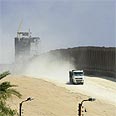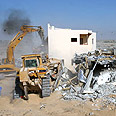

Under the deal, the Egyptians pledged to refrain from openly transferring weapons to the Palestinians. The amendment was added after the Knesset Defense and Foreign Affairs Committee expressed its concern, saying the agreement addressed weapon smuggling, but did not include an Egyptian commitment to refrain from providing the Palestinians with weapons openly.
Knesset Defense and Foreign Affairs Committee Chairman Yuval Shteinitz slammed the agreement, saying "(Former Prime Minister Menachem) Begin is turning in his grave."
"The government sells off the main achievement of the peace deal with Egypt – the removal of the Egyptian army from Israel's borders – for nothing," he said. "The Knesset is tasked with the duty to thwart this miserable agreement and salvage the Sinai's demilitarization."
Palestinians to recycle rubble
In addition, the sides were able to strike a deal on clearing the rubble to be left in the wake of Gaza house demolitions. According to the agreement, a third party would transfer the rubble of settlers' homes to Egypt, while toxic substances would be buried in Israel.
Defense Ministry Director-General Amos Yaron and Palestinian Minister for Civilian Affairs Muhammad Dahlan signed on Tuesday, separately, a letter of understandings formulated by American mediator James Wolfensohn
As a result of disagreements, it was decided that each side will sign a separate document, instead of a direct agreement between Israel and the Palestinians.
According to the deal, the Palestinians will use about 80 percent of the rubble, which can be recycled
Security officials said the agreement is a huge Israeli achievement, which allows the implementation of this part of the disengagement plan in a manner that leaves all sides satisfied. The deal allows Israel to avoid deploying forces on the Philadelphi route, a site of many attacks, the officials said.















